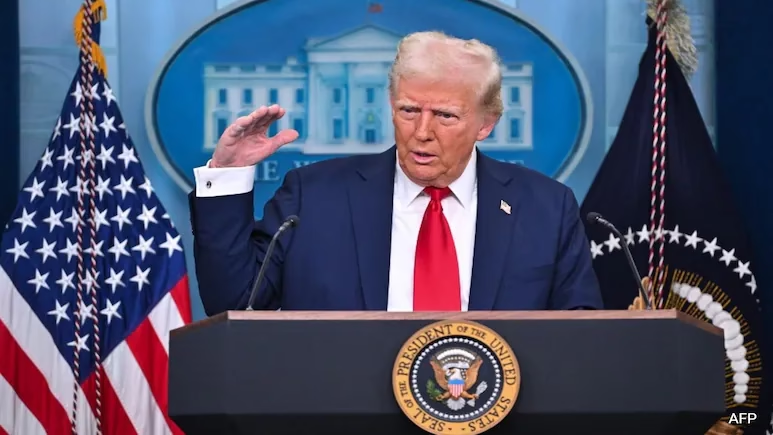Donald Trump, In a recent statement that has sparked widespread debate, defended his administration’s approach to tariffs, insisting that the economic pain caused by these measures would ultimately be worth the price. Speaking to a gathering of supporters, Trump reiterated his belief that tariffs are a necessary tool to protect American industries and workers, even if they lead to short-term challenges. His comments come at a time when global trade tensions remain high, and many are questioning the long-term impact of such policies on the U.S. and global economies.
Trump’s unwavering stance on tariffs has been a hallmark of his economic policy, both during his presidency and in his current political endeavors. He argues that tariffs are essential to level the playing field for American businesses, particularly in industries like manufacturing, which have faced intense competition from abroad. By imposing tariffs on imported goods, Trump believes the U.S. can encourage domestic production, create jobs, and reduce reliance on foreign markets. However, critics argue that these measures often lead to higher prices for consumers and strained relationships with key trading partners.
The former president’s remarks were met with mixed reactions. Supporters applaud his commitment to putting America first, viewing tariffs as a bold move to reclaim economic sovereignty. They argue that the initial discomfort caused by tariffs is a small price to pay for the long-term benefits of a stronger, more self-reliant economy. On the other hand, opponents warn that the costs of tariffs could outweigh the benefits, pointing to the potential for trade wars, disrupted supply chains, and increased costs for businesses and consumers alike.
Trump’s defense of tariffs also highlights the broader debate over globalization and its impact on national economies. While globalization has led to increased trade and economic interdependence, it has also raised concerns about job losses, wage stagnation, and the erosion of domestic industries. Trump’s tariff policies are seen by many as a direct response to these challenges, aiming to protect American workers and industries from what he describes as unfair trade practices by other countries.
Despite the controversy, Trump remains steadfast in his belief that tariffs are a necessary and effective tool. He often cites the steel and aluminum industries as examples of sectors that have benefited from protective measures. By imposing tariffs on imported steel and aluminum, Trump claims that these industries have seen a resurgence, with new investments and job creation. However, critics counter that the gains in these sectors have been offset by losses in others, particularly industries that rely on imported materials and face higher production costs as a result of tariffs.
The global response to Trump’s tariff policies has been largely critical, with many countries viewing them as protectionist and detrimental to free trade. Some nations have retaliated with their own tariffs on U.S. goods, leading to a tit-for-tat escalation that has further complicated international trade relations. The ongoing trade disputes have also raised concerns about the stability of the global economy, with some experts warning that prolonged tensions could lead to a slowdown in growth and increased uncertainty for businesses and investors.
Amid the debate, Trump’s message to Americans is clear: the short-term pain caused by tariffs is a necessary sacrifice for the long-term health of the economy. He urges patience and resilience, arguing that the benefits of a stronger, more self-sufficient economy will eventually outweigh the initial costs. Whether this vision will come to fruition remains to be seen, but one thing is certain – the debate over tariffs and their impact on the economy is far from over.
As the world continues to grapple with the complexities of global trade, Trump’s tariff policies serve as a reminder of the delicate balance between protecting domestic interests and fostering international cooperation. While the path forward may be uncertain, the conversation sparked by Trump’s remarks underscores the importance of finding solutions that benefit not just one nation, but the global community as a whole.
In the end, the question of whether the pain from tariffs is worth the price is one that will be answered not by rhetoric, but by results. As businesses, workers, and consumers navigate the challenges of a changing economic landscape, the true impact of Trump’s policies will become clearer. For now, the debate rages on, with supporters and critics alike watching closely to see how this bold experiment in economic policy will unfold.
Trump’s unwavering confidence in his approach is both a source of inspiration for his supporters and a point of contention for his critics. As the world watches and waits, one thing is certain – the conversation about tariffs, trade, and the future of the global economy is far from over. Whether history will judge Trump’s tariff policies as a necessary step toward economic independence or a costly misstep remains to be seen, but one thing is clear: the stakes are high, and the world is watching.





